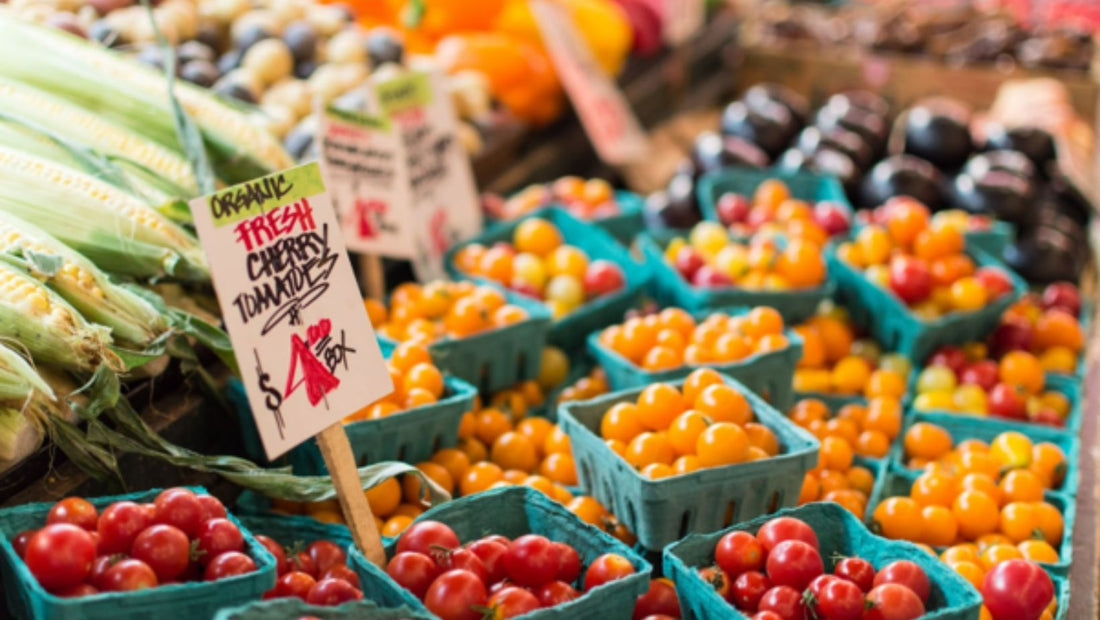We get asked a lot – is spray-free the same as organic?
It’s no wonder people are confused, there are so many terms to describe how food is produced. Spray-free, certified organic, organic, pesticide-free, chemical-free, biodynamic…. the list goes on.
And there are a lot of differences, even within these categories.
Did you know that certified organic produce is not necessarily pesticide-free, just synthetic pesticide-free? Or that spray-free might mean pesticides aren’t sprayed on the produce, but the soil may still be treated with chemical fertiliser, or the seeds dipped in a fungicide?
Many farms using the ‘spray-free’ label may still be using natural inputs and sustainable practices, but choose not to get certified for cost or other reasons.
This is where getting to know your farmer can be invaluable, especially if you’re on a budget (and who isn’t right now?). Chances are the food your local spray-free farmer grows is just as healthy as the organic farms, with a lower price tag.
One sure sign your food is free of nasty synthetic chemicals is if you see bugs and grubs on your produce. Thanks for letting us know it’s safe to eat, little ones!
Are spray-free and organic produce the same?
The simple answer is no, spray-free and organic are not the same thing.
The two main differences are:
- Certification: in Australia farmers must meet strict certification requirements to be certified organic. For customers, buying certified organic gives confidence that the produce is of the highest possible standard.
- Price: the certification and regulation costs to certify usually mean more expensive produce. Spray-free fruit and veg tends to be more affordable because of this.
Organic farms grow food using sustainable practices and natural inputs to improve soil fertility, control pests and manage weeds. They don’t use synthetic pesticides, fertilisers, or genetically modified organisms (GMOs).
To be certified organic, farmers go through a rigorous certification process to meet certain standards, along with yearly checks (including unannounced farm visits) to maintain certification. It can take up to three years to become fully certified and costs the farmer thousands of dollars (plus ongoing audit fees). Many people choose certified organic for the peace of mind of knowing that it has met stringent production standards.
The definition of spray-free can vary considerably and use of the label is not regulated. Generally, spray-free means the produce has been grown without synthetic pesticides or herbicides.
Organic certification can be too costly for smaller farmers so often, these farms still use the same organic practices, but do not have the certification.
What spray-free and organic do have in common is that farmers who choose these non-conventional methods are usually very passionate about local, sustainable and environmentally-friendly farming practices.
How do you know the food you’re eating is as healthy as can be?
Your food purchasing decisions are as unique as you are. We suggest you start by getting clear on what’s important to you and your family.
What matters most to you?:
- Getting the healthiest food you can for your family
- Avoiding synthetic pesticides, herbicides and fungicides
- Avoiding all pesticides, herbicides and fungicides, synthetic or natural
- Supporting local farmers and food systems
- Lower food miles
- Supporting environmentally-friendly farming practices
- Budget
- Convenience and availability.
Labels like spray-free and organic can be helpful to figure out where your food fits in with your values, but every farm is different! To really understand where your food comes from and how it fits in with your priorities, you need to find out exactly how it is grown.
In an ideal world, we’d all grow our own food. Then we’d know exactly where it comes from.
If you’re laughing at the absurdity of finding time to tend to a vegetable garden when you’re already busy tending to your other responsibilities, it’s time to get to know your farmers.
To see if they align with your priorities, ask your local farmer:
- How do you manage pests and weeds?
- Do you use fungicides, pesticides, herbicides?
- Are they synthetic?
- What sustainable or regenerative practices do you use?
- Do you use GMO seeds?
If you’re still laughing because you don’t have time for an in-depth interview with your broccoli, apple, and potato farmer, we hear you.
That’s why we started Spray-Free Farmacy. We wanted to get the best possible food for our family’s health (read Kristen’s story). We discovered that knowing your local farmer is the only way you can be 100% sure. Now we do it for hundreds of families every week.
Before we bring produce from a new farm into our warehouse we get to know the farmers. We ask them how they manage pests and weeds, improve their soil, what they’re doing to improve the environment, and so on. Only when we’re confident they meet our criteria, we will start selling their produce and build a great ongoing relationship with them.
You can read more about many of our farmers and makers here.
About 50% of our farmers are certified organic, and the rest are spray-free. They all do an incredible job of bringing the very best food to our tables. We love our farmers!




